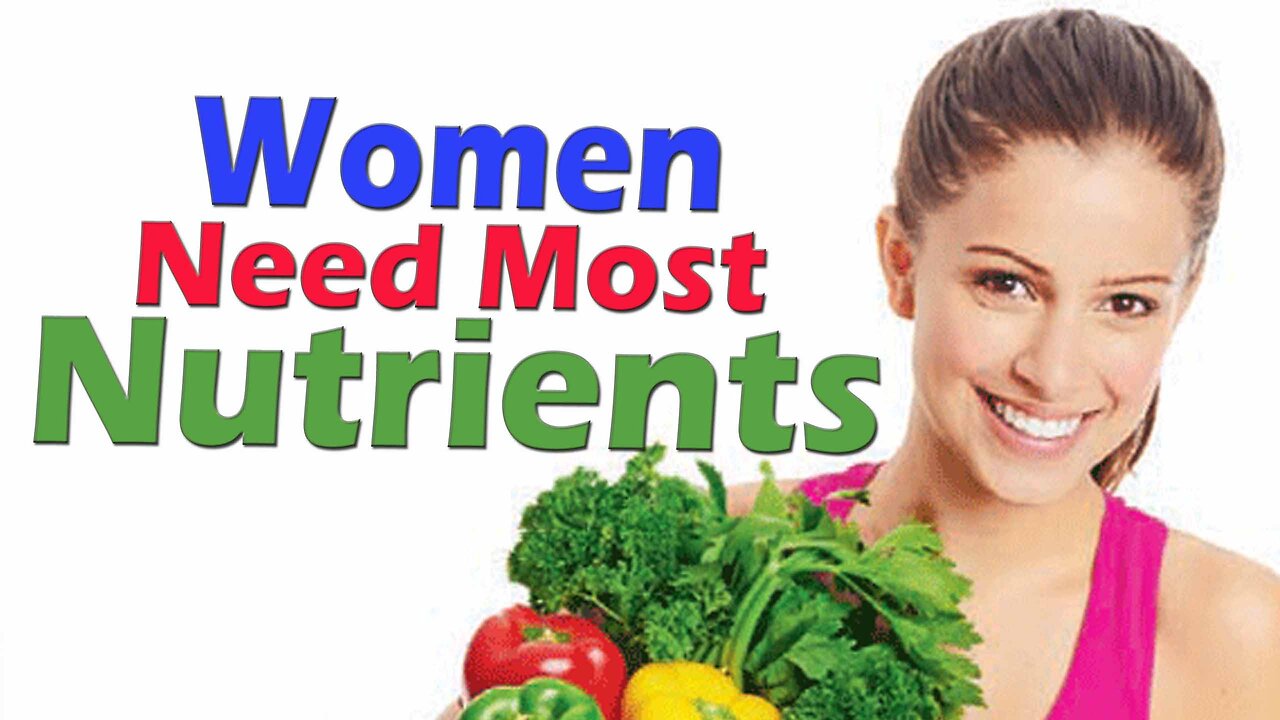Premium Only Content

Nutrients Woman's Need Most | Important for skin health, may help reduce the risk of heart disease |
Hello everyone, and welcome to today's video. In this video, we will be discussing the 20 nutrients that women need the most to maintain optimal health. Women have unique nutrient needs that differ from men, and it is important to understand what these nutrients are and how to incorporate them into our diets. So, without further ado, let's get started.
Calcium
Calcium is essential for building and maintaining strong bones. Women are at a higher risk of developing osteoporosis than men, so it is particularly important for women to get enough calcium in their diet. Good sources of calcium include dairy products, leafy green vegetables, and fortified foods such as orange juice.
Iron
Iron is necessary for the production of hemoglobin, which carries oxygen throughout the body. Women need more iron than men due to blood loss during menstruation. Good sources of iron include red meat, poultry, seafood, beans, and fortified cereals.
Folate
Folate, also known as folic acid, is essential for cell growth and development. It is particularly important for pregnant women to get enough folate to prevent birth defects. Good sources of folate include leafy green vegetables, citrus fruits, and fortified grains.
Vitamin D
Vitamin D is essential for bone health and immune function. Women are often deficient in vitamin D, especially those who live in areas with limited sun exposure. Good sources of vitamin D include fatty fish, egg yolks, and fortified dairy products.
Omega-3 Fatty Acids
Omega-3 fatty acids are important for heart health and brain function. Women are often deficient in omega-3s, which can increase their risk of heart disease and depression. Good sources of omega-3s include fatty fish, flaxseed, and walnuts.
Magnesium
Magnesium is necessary for bone health, nerve function, and energy production. Women who experience premenstrual syndrome (PMS) may benefit from magnesium supplements. Good sources of magnesium include leafy green vegetables, nuts, and whole grains.
Vitamin K
Vitamin K is essential for blood clotting and bone health. Women who take blood-thinning medications should talk to their doctor before increasing their intake of vitamin K. Good sources of vitamin K include leafy green vegetables, broccoli, and soybeans.
Vitamin E
Vitamin E is an antioxidant that protects the body from damage caused by free radicals. It is important for skin health and may help reduce the risk of heart disease. Good sources of vitamin E include nuts, seeds, and vegetable oils.
Vitamin C
Vitamin C is an antioxidant that supports the immune system and helps the body absorb iron. It is important for skin health and may help reduce the risk of chronic diseases. Good sources of vitamin C include citrus fruits, berries, and kiwi.
B Vitamins
B vitamins, including thiamin, riboflavin, niacin, vitamin B6, and vitamin B12, are essential for energy production, brain function, and cell metabolism. Good sources of B vitamins include whole grains, meat, poultry, fish, and dairy products.
Zinc
Zinc is necessary for immune function, wound healing, and cell growth and division. Women who are pregnant or breastfeeding may need more zinc than usual. Good sources of zinc include meat, seafood, and whole grains.
Copper
Copper is necessary for the formation of red blood cells and bone health. Women who take zinc supplements should also take copper supplements to prevent a copper deficiency. Good sources of copper include shellfish, nuts, and seeds.
-
 2:52:48
2:52:48
Music7
7 months agoPunjabi Super hits Music Mashup
741 -
 LIVE
LIVE
Drew Hernandez
5 hours agoISRAEL BOMBS GAZA HOSPITAL ON LIVE TV KILLING AT LEAST 20 INCLUDING JOURNALISTS & CIVILIANS
662 watching -
 2:55:23
2:55:23
TimcastIRL
4 hours agoTrump Orders Specialized National Guard Units To Combat Crime In Cities, Dems Furious | Timcast IRL
159K106 -
 LIVE
LIVE
SpartakusLIVE
6 hours ago#1 Rocket CHAMPION of Verdansk wields UNSTOPPABLE new META
957 watching -
 2:55:11
2:55:11
Barry Cunningham
5 hours agoPRESIDENT TRUMP MADE TODAY A VERY BAD DAY TO BE A DEMOCRAT!
66.5K47 -
 1:15:29
1:15:29
Flyover Conservatives
23 hours agoFrom Cool to Cringe: How Democrats Lost America’s Ear | FOC Show
23.5K4 -
 8:19
8:19
MattMorseTV
9 hours ago $0.26 earnedTrump is ACTUALLY DOING IT.
21.5K33 -

ZWOGs
12 hours ago🔴LIVE IN 1440p! - Tarkov w/ Casey & crgoodw1n, Kingdom Come Deliverance, & More - Come Hang Out!
18K5 -

We Like Shooting
15 hours ago $0.03 earnedWe Like Shooting 625 (Gun Podcast)
13K1 -
 1:45:02
1:45:02
Glenn Greenwald
6 hours agoIsrael Slaughters More Journalists, Hiding War Crimes; Trump's Unconstitutional Flag Burning Ban; Glenn Takes Your Questions | SYSTEM UPDATE #504
113K129